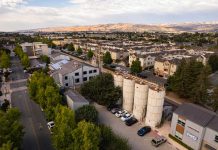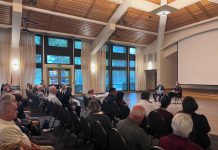Recently, a newspaper article informed that the projected average life span for a person born this year is 76.2 years.
This gave me pause because my 76th birthday was Sept. 11. If I live to the end of November, I will have accomplished what a person born this year can expect as a lifespan.
Pondering this fact of longevity, I chance to remember my Oklahoma youth and my “Class of ’47” who graduated 59 years ago. Reminiscing, casting a backward glance, I see a different time. I remember the way we, your grandparents, were. Our young lives faced World War II and, later, staunchly experienced the Korean War. Many of us participated in the harshness of conflict. Yet, we, your grandparents, emerged a strong young people. We were ready to face life’s adversities.
Of course, our lives were problematical and we looked straight forward at adversity. But, we had hope of new frontiers. We persevered.
In 1945, World War II ended and so did our childhood. Shortly after, we were driving cars to high school and, on weekends, even dating girls from neighboring towns and even far away Oklahoma City. I still remember the thrill of that “Friday afternoon” feeling, the anticipation of the weekend adventure.
Some of us liked to think of ourselves as playboys, but seriously, we were really from the establishment generation. Since our lives began in the Great Depression, we were security oriented and devoted to family.
Our early ‘teens meant Sunday afternoon after church, surrounded by aunts, uncles and grandma, reading the funny papers and listening to “One Man’s Family” on the radio. Men were the bread winners. Women were essentially wives, mothers and keepers of the home fires. The sense of commitment ran deep.
As teenagers, we could ride the bus to the downtown square and see a picture show. For 5 cents, we rode down town and with another 5 cents and 5 Dr. Pepper bottle caps, we watched cowboys and Indians, dastardly villains or Buck Rogers rocket movies. For 5 cents more, we rode home on the bus.
Before television, the picture shows were our fantasy factories.
My buddies and I rode to school in girl friend, Virginia Munger’s gigantic “four holer” Buick. (Her father was rich and owned the largest building in town, some twenty stories. Oh! In the forties, Buick’s had two, three, and four fake exhaust holes along both front fenders, depending on how expensive they were … just like this year’s models.)
Perhaps more specifically characterizing our class’ fun, on many icy winter’s evenings ensconced in our parent’s cars, we charged down hill on snowy Cherokee Street to flatten out at Jefferson, then hit the brakes to spin around and around on the humungously wide icy street at the bottom.
Nevertheless, we thought the whole world went dancing on Saturday night. We had formal dances in the ballroom of the Youngblood Hotel. The girls donned formal dresses and the boys sported suits. Above our heads turned a ball of great girth, studded with tiny mirrored squares. As the ball revolved – red, blue, white and green – spot lights beamed upon it and the ballroom became a many splendored thing.
Formal dances were few during our school year. On most Saturday nights, we casually danced at “The Rat,” although out front, the neon sign called the place the “Mickey Mouse Club.” No matter, this large one-story concrete block building, with a rounded metal roof resembling an over-sized Quonset hut was always called “The Rat” by us.
As our era demanded, from the ceiling above the dance floor hung a spectacular revolving mirrored ball. Of course, a many splendored thing.
Slow dancing was the vogue and dancers held each other close. The songs were romantic and melodious. We danced to the big band greats: Woody Herman, Harry James, Stan Kenton, Les Brown and all the big bands. Singing our songs were Frank Sinatra, Nat “King” Cole, June Christie, Doris Day, Peggy Lee and other magnificent singers. But, each dance ended with Artie Shaw’s rendition of the dreamy song, “Stardust.” We thought that the song by composer Hoagy Carmichael would last forever.
“The Rat” became our crucible.
We were exceptional. We experienced the “Depression” and “World War II.” We experienced the change of society from the old to the new era. We experienced the transition from a staid agricultural existence to a modern fast-growing society. We experienced the change from the “before World War II” plodding experience to the vibrant “after the war” ebullient life. More importantly, we were products of the new America.
We are your grandparents. And, you are our prodigy. Live long and prosper.
Burton Anderson, a U.S. Marine veteran of the Korean War, has lived in California for about 50 years. He has a background in aerospace industry. He can be reached at ba****@*ol.com.







